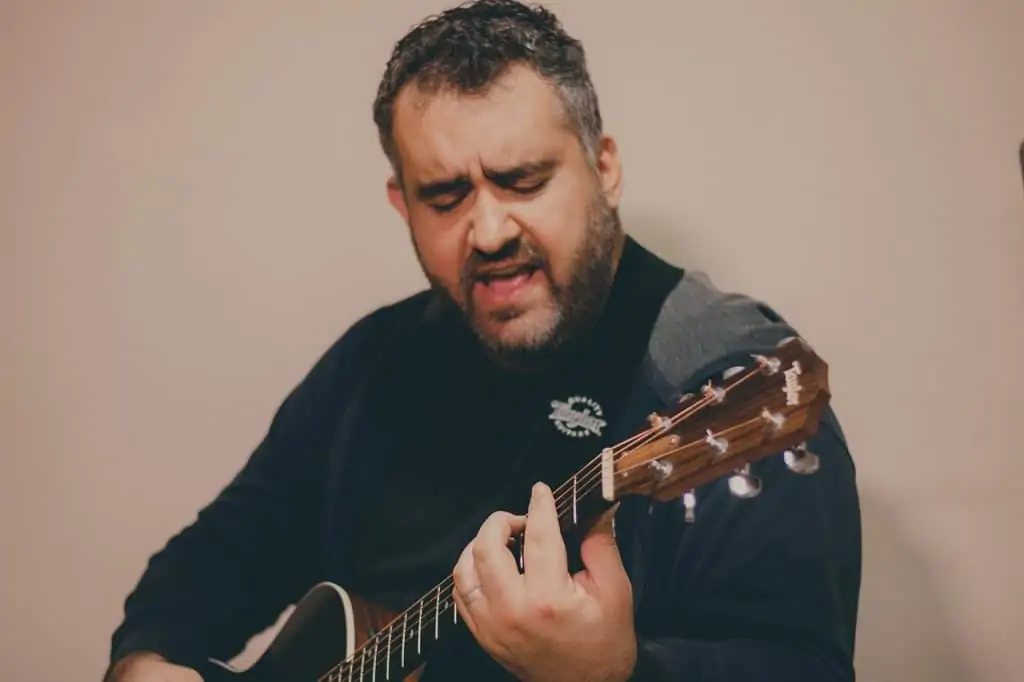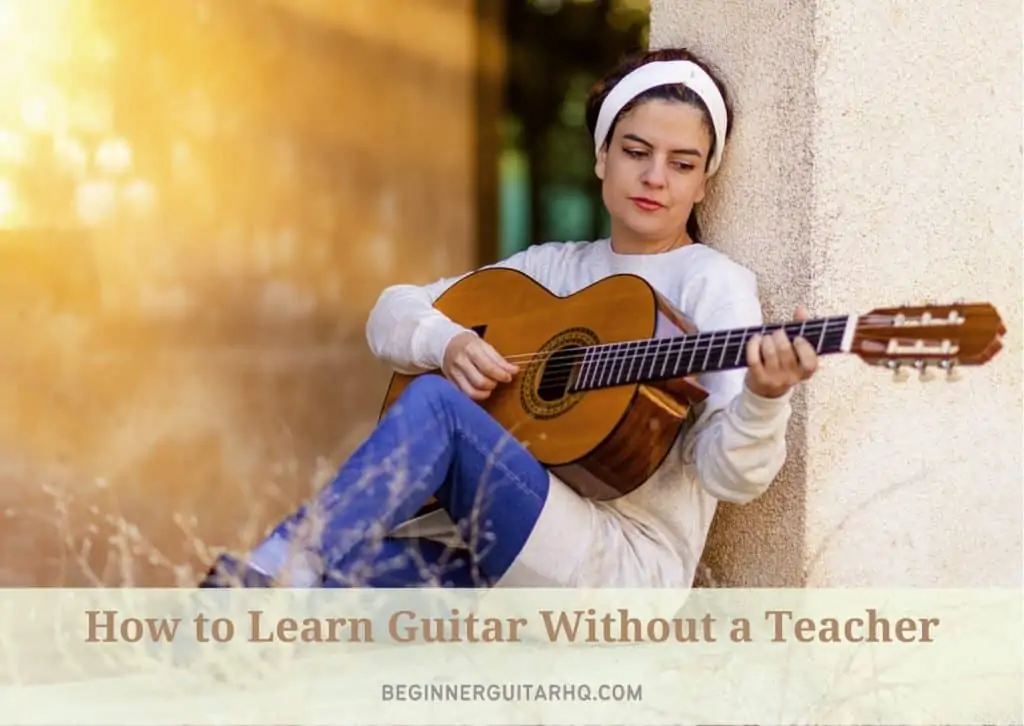Want to learn guitar without a teacher? While I used to have a piano teacher and currently have a violin teacher, I taught myself to play guitar for the most part. When I say, for the most part, I mean that a friend of a family friend showed me how to play A and D. Those were the first chords I learned to play.
My friend was with me and later that day when we got home, we wrote a song with those two chords before we finally couldn’t bear to play anymore. It took another three days before I could play again, my fingers were so sore. Of course, the chord changes were slow in the beginning, but we got there.
That day set me up for my guitar journey and gave me the start I needed to learn the skills I have today. Aside from that half an hour or so, I am self-taught with a correction here or there by other more experienced guitarists. So I know for a fact that you can learn to play the guitar without a teacher.
It takes discipline, consistency, and patience. All that work will pay off, soon you’ll have lots of fun playing songs you love and even writing your own songs.
Contents
Why Learn Guitar Without a Teacher?
First things first, I have nothing against guitar lessons. They can be very helpful, and certainly, if you’re struggling to get beyond a certain level of playing, a guitar teacher can help by seeing what the issue is and helping to correct it. Guitar teachers also structure their lessons in a way that will help you progress logically.
But lessons are often also expensive. This isn’t the case for every teacher or music school, but it can be hard to find an affordable teacher. Especially if you’ve saved up for a long time to buy a guitar and you’re now strapped for cash.
Playing guitar can be very difficult as it becomes very intricate as you go up the higher skill levels. But you can play pretty decently, even without lessons, at very least to the intermediate level. And if you’re dedicated and practice consistently, it’s possible to become a great guitarist and play advanced songs or write your own songs with advanced techniques, even without a teacher.
It just depends on how you learn better. But don’t let money or access to a teacher be the thing that holds you back.
Here are a few tips to get you going on your own.
YouTube
YouTube is your friend here, particularly if you learn better from watching people. There are also a lot of reputable guitar teaching websites that have their videos on their website and on YouTube too. You can learn for free thanks to YouTube.
It’s as simple as a quick search, which will bring up lessons for you to choose from. Here are a few good options for various skill levels:
Guitareo
Here you can learn about chords, scales, strumming, picking, fingerstyle, and more in a way that’s easy to understand.
Active Melody
Learn to play lead and rhythm in simple ways, and how to get your playing to sound better. He also teaches how to play jazz guitar, blues, and country.
Paul Davids
Take your playing to the next level with Paul Davids. A lot of his stuff is more complicated, but there are videos where you can glean a few easy tips to sound great. And as you improve and level up, you can’t go wrong with the things you’ll learn in these videos.
Rick Beato
If you need to get your music theory up to snuff, check out his videos. He also has a video series called “What Makes This Song Great” that can help you to think about music and how to construct awesome songs of your own.
Guitar Teaching Websites
You can find many articles on Beginner Guitar HQ to help you on your journey. If you want to learn chords in general, check out basic guitar chords to get you started. If you’re into jazz, here’s a jazz chart to gain some skills in that department.
Learn a few beginner guitar licks to get you going. Best of all, learn to play in whatever genre you like. You’ll have a much better chance of succeeding if you actually enjoy what you’re playing most of the time.
Other than us, you can also check out the Best Online Guitar Lessons. Here you’ll find sites like Guitar Tricks, JamPlay, TrueFire, Justin Guitar, and more. Among the sites listed in that article, are free and paid options. Some sites will teach you certain things for free but have you pay for more advanced lessons. You may also find you have to pay for resources, but there are some sites where these are free.
I myself really enjoy Justin Guitar when I am looking to learn something outside my comfort zone.
If you’d like to find some on your own, simply search for online guitar lessons. But make sure that the sites that require payment are legit and worth the money they charge.
Guitar Teaching Apps
Learn to play the guitar from your phone. I’ve personally tried the Melodiq app as well as Yousician. Honestly, out of the two, Yousician is better in my opinion, especially in terms of timing. You’ll definitely learn to play in time, an invaluable skill, especially when playing with others.
I will also say, that while these are great, watching tabs get highlighted or a little ping pong ball bouncing on the tabs is too stressful. I’m laughing at myself as I write this, but it just doesn’t work with my learning style. I’m far better at getting chords or tabs from an app like Ultimate Guitar and learning songs that way.
What these apps will also train is your dexterity, your accuracy, strumming technique, and picking technique.
Guitar Books
This is how I learned. When I started playing, I didn’t really have easy access to the internet. So I went to the library and I got myself some books. That’s how I learned to play chords and how to read tabs, and how to play sheet music on the guitar.
You can try something like Guitar Exercises for Beginners: 10x Your Skills in 10 Minutes A Day by Guitar Head or Guitar: The First 100 Chords for Guitar: How to Learn and Play Guitar Chords: The Complete Beginner Guitar Method by Mr. Joseph Alexander.
You can find physical paperbacks or get an E-book.
Check out the music stores in your area, you may find guitar books there if you prefer to shop that way. Or, if you don’t mind being old-school, and you have access to a library, borrow some guitar books for free.
You can also find songbooks from your favorite musicians online, in instrument shops, and even in libraries.
Play With Other People
This sounds scary if you’re just starting out. That’s totally understandable. It’s a good idea to learn some chords and get to the point where you can change quickly enough. This should help with your nerves. But even if you’re still a little slower on the chord changes, you can still benefit from a jam session.
You will pick up skills from other people, get a feel for music, and learn to get creative if your skills are lagging a bit. This experience is invaluable. Some places have mass jam sessions where you can find people of similar skill levels to yours to play with.
As a beginner guitarist, in those first few months, my friend and I played together often. We would get songbooks and sing together while playing the chords. As mentioned, sometimes we wrote and played our own songs.
Yes, playing with a beginner friend can make you pick up bad habits, but that’s where books, websites, and YouTube come in. Don’t let what I said about the bad habits put you off. It’s fun to play with a friend and make music together. And depending on your friends and your personality, it’s also potentially less embarrassing than playing in front of strangers or with strangers.
Do try to play with more experienced people too if you have the opportunity. After playing guitar for a few months, I decided to start playing at church. Not during the services at first, but just jamming with the other musicians on Friday nights.
It was on one of these evenings that one of the more experienced guitarists told me I was playing the G chord wrong and showed me how to do it correctly. I have never forgotten that, and it’s just over 15 years later.
Learn Different Techniques Through Song
There is a lot of value in learning scales and arpeggios. There are a lot of exercises that will improve your dexterity and strength too. But these can get really boring. Arpeggios (essentially playing notes of a chord one at a time) are musical, but some exercises and scales just aren’t.
The best way to put these things into a real-world setting is to play songs. You can see how the notes go together, all the ways you can mix them up to create melodies. You’ll learn different effects and techniques through emulating the way the artists play in the songs. Trying to match the timing (start slow) will help you with both chord changes and picking.
Most of all, you’ll be having fun and soon you’ll even be able to develop your own style of playing.
This isn’t permission to ditch the scales, arpeggios, and other exercises for both your fretting hand and your strumming/picking hand. They’re important, and they do help. But include songs in your practice too so you can broaden your horizons and to start building a repertoire.
Be Patient
Now that you know all the practical ways to start learning how to play guitar on your own, you need to be on board mentally, too.
You will need to practice consistently. Every day preferably. If all you can manage is 10 minutes, that’s better than nothing. You’ll also build calluses that way so that when you do play longer, your fingers won’t hurt as much or even at all.
Learning an instrument takes time. Don’t compare yourself to others. Just keep your practice sessions up. And practice well. Sloppy practice will make for sloppy playing.
One of the biggest things that can stop budding musicians in their tracks is unrealistic expectations and goals. That, and fear. So be patient with yourself, practice regularly, and as your skills improve and increase, you’ll play more confidently.
Some Extra Tips
- Practice with a metronome, sloppy timing can ruin a song
- Practice both rhythm and lead guitar to become a well-rounded guitarist
- Don’t be afraid to sing and play
- Use your pinky, it really is necessary sometimes and needs time to get stronger
- Stay positive, focusing on the negatives can drag you down and make you stop playing, the only way to get better is to keep practicing
- Practice with and without a pick (plectrum)
- Find songs within your skill level to practice techniques without discouraging you
- Once you’ve mastered a level, go to the next one (and be patient with yourself) but don’t totally neglect the basics just because you’ve mastered them, skills can be unlearned too
Conclusion
Well, there you have it. There is no need to think you can’t learn to play the guitar just because you don’t have access to formal lessons or prefer not to go to lessons.
There are so many resources, both free and paid, out there that you can use to start learning. Practice regularly, practice well, and you’ll be well on your way to playing songs that you enjoy. While many people can play simple things within a week or two, it can take longer than that.
Just be patient with yourself. You’ll definitely notice improvement every week or two with consistent practice. Even if you only have 10 minutes a day, that’s better than skipping practices.
Remember to check out Beginner Guitar HQ for more material to enhance and simplify your learning experience. Most of all, have fun!

Cheanné Lombard lives in the home of one of the new Seven World Wonders, Cape Town, South Africa. She can’t go a day without listening to or making music.
Her love of music started when her grandparents gave her a guitar. It was a smaller version of the full-sized guitars fit for her little hands. Later came a keyboard and a few years after that, a beautiful dreadnought guitar and a violin too. While she is self-taught when it comes to the guitar, she had piano lessons as a child and is now taking violin lessons as an adult.
She has been playing guitar for over 15 years and enjoys a good jam session with her husband, also an avid guitarist. In fact, the way he played those jazzy, bluesy numbers that kindled the fire in her punk rock heart. Now she explores a variety of genres and plays in the church worship group too and with whoever else is up for a jam session.

